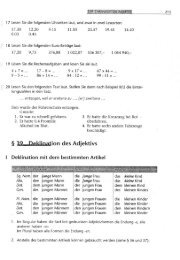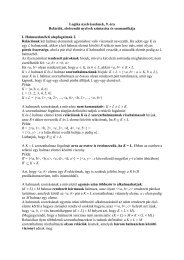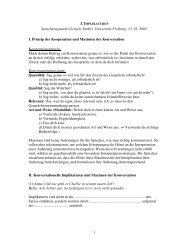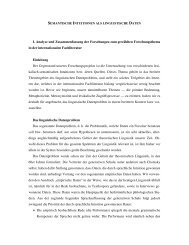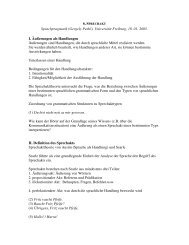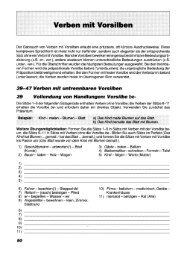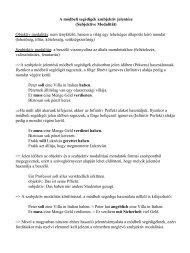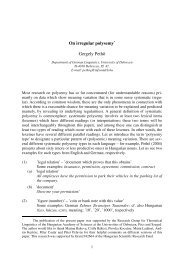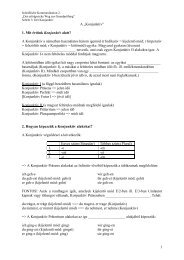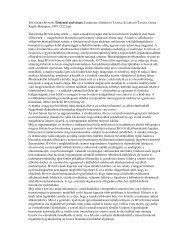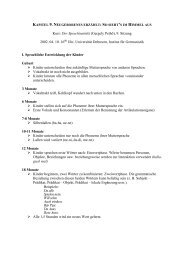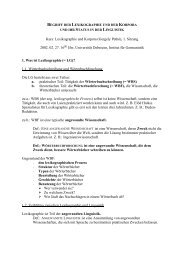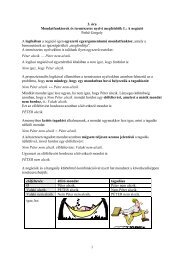indirect requests
indirect requests
indirect requests
You also want an ePaper? Increase the reach of your titles
YUMPU automatically turns print PDFs into web optimized ePapers that Google loves.
Chapter 2<br />
INDIRECT SPEECH ACTS<br />
INTRODUCTION<br />
The simplest cases of meaning are those in which the speaker<br />
utters a sentence and means exactly and literally what he says.<br />
In such cases the speaker intends to produce a certain<br />
illocutionary effect in the hearer, and he intends to produce<br />
this effect by getting the hearer to recognize his intention to<br />
produce it, and he intends to get the hearer to recognize this<br />
intention in virtue of the hearer's knowledge of the rules that<br />
govern the utterance of the sentence. But, notoriously, not all<br />
cases of meaning are this simple: In hints, insinuations, irony,<br />
and metaphor - to mention a few examples - the speaker's<br />
utterance meaning and the sentence meaning come apart in<br />
various ways. One important class of such cases is that in<br />
which the speaker utters a sentence, means what he says, but<br />
also means something more. For example, a speaker may<br />
utter the sentence "I want you to do it" by way of requesting<br />
the hearer to do something. The utterance is incidentally<br />
meant as a statement, but it is also meant primarily as a<br />
request, a request made by way of making a statement. In<br />
such cases a sentence that contains the illocutionary force<br />
indicators for one kind of illocutionary act can be uttered to<br />
perform, in addition, another type of illocutionary act. There<br />
are also cases in which the speaker may utter a sentence and<br />
mean what he says and also mean another illocution with a<br />
different prepositional content. For example, a speaker may<br />
utter the sentence "Can you reach the salt?" and mean it not<br />
merely as a question but as a request to pass the salt.<br />
In such cases it is important to emphasize that the<br />
utterance is meant as a request; that is, the speaker intends to<br />
produce in the hearer the knowledge that a request has been<br />
made to him, and he intends to produce this knowledge by<br />
30<br />
Indirect speech acts<br />
means of getting the hearer to recognize his intention to<br />
produce it. Such cases, in which the utterance has two<br />
illocutionary forces, are to be sharply distinguished from the<br />
cases in which, for example, the speaker tells the hearer that<br />
he wants him to do something; and then the hearer does it<br />
because the speaker wants him to, though no request at all<br />
has been made, meant, or understood. The cases we will be<br />
discussing are <strong>indirect</strong> speech acts, cases in which one<br />
illocutionary act is performed <strong>indirect</strong>ly by way of performing<br />
another.<br />
The problem posed by <strong>indirect</strong> speech acts is the problem<br />
of how it is possible for the speaker to say one thing and mean<br />
that but also to mean something else. And since meaning<br />
consists in part in the intention to produce understanding in<br />
the hearer, a large part of that problem is that of how it is<br />
possible for the hearer to understand the <strong>indirect</strong> speech act<br />
when the sentence he hears and understands means<br />
something else. The problem is made more complicated by<br />
the fact that some sentences seem almost to be conventionally<br />
used as <strong>indirect</strong> <strong>requests</strong>. For a sentence like "Can you reach<br />
the salt?" or "I would appreciate it if you would get off my<br />
foot", it takes some ingenuity to imagine a situation in which<br />
their utterances would not be <strong>requests</strong>.<br />
In Searle (1969: chapter 3) I suggested that many such<br />
utterances could be explained by the fact that the sentences in<br />
question concern conditions of the felicitous performance of<br />
the speech acts they are used to perform <strong>indirect</strong>ly -<br />
preparatory conditions, prepositional content conditions,<br />
and sincerity conditions - and that their use to perform<br />
<strong>indirect</strong> speech acts consists in indicating the satisfaction of<br />
an essential condition by means of asserting or questioning<br />
one of the other conditions. Since that time a variety of<br />
explanations have been proposed, involving such things as<br />
the hypostatization of "conversational postulates" or<br />
alternative deep structures. The answer originally suggested<br />
in Searle (1969) seems to me incomplete, and I want to<br />
develop it further here. The hypothesis I wish to defend is<br />
simply this: In <strong>indirect</strong> speech acts the speaker communicates<br />
to the hearer more than he actually says by way of relying
Indirect speech acts<br />
on their mutually shared background information, both<br />
linguistic and nonlinguistic, together with the general<br />
powers of rationality and inference on the part of the hearer. I<br />
To be more specific, the apparatus necessary to explain the<br />
<strong>indirect</strong> part of <strong>indirect</strong> speech acts includes a theory of<br />
speech acts, certain general principles of cooperative<br />
conversation (some of which have been discussed by Grice<br />
(1975)), and mutually shared factual background information<br />
of the speaker and the hearer, together with an ability<br />
on the part of the hearer to make inferences. It is not<br />
necessary to assume the existence of any conversational<br />
postulates (either as an addition to the theory of speech acts<br />
or as part of the theory of speech acts) nor any concealed<br />
imperative forces or other ambiguities. We will see, however,<br />
that in some cases, convention plays a most peculiar role.<br />
Aside from its interest for a theory of meaning and speech<br />
acts, the problem of <strong>indirect</strong> speech acts is of philosophical<br />
importance for an additional reason. In ethics it has<br />
commonly been supposed that "good", "right", "ought",<br />
etc. somehow have an imperative or "action guiding"<br />
meaning. This view derives from the fact that sentences such<br />
as "You ought to do it" are often uttered by way of telling the<br />
hearer to do something. But from the fact that such sentences<br />
can be uttered as directives 1 it no more follows that "ought"<br />
has an imperative meaning than from the fact that "Can you<br />
reach the salt?" can be uttered as a request to pass the salt it<br />
follows that can has an imperative meaning. Many confusions<br />
in recent moral philosophy rest on a failure to understand the<br />
nature of such <strong>indirect</strong> speech acts. The topic has an<br />
additional interest for linguists because of its syntactical<br />
consequences, but I shall be concerned with these only<br />
incidentally.<br />
1 The class of "directive" illocutionary acts includes acts of ordering,<br />
commanding, requesting, pleading, begging, praying, entreating, instructing,<br />
forbidding, and others. See Searle (1975a, chapter 1 of this volume) for an<br />
explanation of this notion.<br />
Indirect speech acts<br />
A SAMPLE CASE<br />
Let us begin by considering a typical case of the general<br />
phenomenon of <strong>indirect</strong>ion:<br />
1. Student X: Let's go to the movies tonight<br />
2. Student Y: I have to study for an exam.<br />
The utterance of (1) constitutes a proposal in virtue of its<br />
meaning, in particular because of the meaning of "Let's". In<br />
general, literal utterances of sentences of this form will<br />
constitute proposals, as in:<br />
3. Let's eat pizza tonight<br />
or:<br />
4. Let's go ice skating tonight.<br />
The utterance of 2 in the context just given would normally<br />
constitute a rejection of the proposal, but not in virtue of its<br />
meaning. In virtue of its meaning it is simply a statement<br />
about Y. Statements of this form do not, in general,<br />
constitute rejections of proposals, even in cases in which they<br />
are made in response to a proposal. Thus, if Y had said:<br />
5. I have to eat popcorn tonight<br />
or:<br />
6. I have to tie my shoes<br />
in a normal context, neither of these utterances would have<br />
been a rejection of the proposal. The question then arises,<br />
How does X know that the utterance is a rejection of the<br />
proposal? and that question is a part of the question, How is<br />
it possible for Y to intend or mean the utterance of 2 as a<br />
rejection of the proposal? In order to describe this case, let us<br />
introduce some terminology. Let us say that the primary<br />
illocutionary act performed in Y's utterance is the rejection of<br />
the proposal made by X, and that Y does that by way of<br />
performing a secondary illocutionary act of making a statement<br />
to the effect that he has to prepare for an exam. He performs<br />
the secondary illocutionary act by way of uttering a sentence<br />
the literal meaning of which is such that its literal utterance<br />
33
Indirect speech acts<br />
constitutes a performance of that illocutionary act. We may,<br />
therefore, further say that the secondary illocutionary act is<br />
literal; the primary illocutionary act is not literal. Let us<br />
assume that we know how X understands the literal<br />
secondary illocutionary act from the utterance of the<br />
sentence. The question is, How does he understand the<br />
nonliteral primary illocutionary act from understanding the<br />
literal secondary illocutionary act? And that question is part<br />
of the larger question, How is it possible for Y to mean the<br />
primary illocution when he only utters a sentence that means<br />
the secondary illocution, since to mean the primary illocution<br />
is (in large part) to intend to produce in X the relevant<br />
understanding ?<br />
A brief reconstruction of the steps necessary to derive the<br />
primary illocution from the literal illocution would go as<br />
follows. (In normal conversation, of course, no one would<br />
consciously go through the steps involved in this reasoning.)<br />
Step 1: I have made a proposal to Y, and in response he has made a<br />
statement to the effect that he has to study for an exam (facts about the<br />
conversation).<br />
Step 2:1 assume that Y is cooperating in the conversation and that<br />
therefore his remark is intended to be relevant (principles of<br />
conversational cooperation).<br />
Step 3: A relevant response must be one of acceptance, rejection,<br />
counterproposal, further discussion, etc. (theory of speech acts).<br />
Step 4: But his literal utterance was not one of these, and so was not<br />
a relevant response (inference from Steps 1 and 3).<br />
Step 5: Therefore, he probably means more than he says. Assuming<br />
that his remark is relevant, his primary illocutionary point must<br />
differ from his liter alone (inference from Steps 2 and 4). 2<br />
This step is crucial. Unless a hearer has some inferential<br />
strategy for finding out when primary illocutionary points<br />
differ from literal illocutionary points, he has no way of<br />
understanding <strong>indirect</strong> illocutionary acts.<br />
2 For an explanation of the notion of "illocutionary point" and its relation to<br />
illocutionary force, see (Searle, 1975a, chapter 1 of this volume).<br />
34<br />
Indirect speech acts<br />
Step 6:I know that studying for an exam normally takes a large<br />
amount of time relative to a single evening, and I know that going to the<br />
movies normally takes a large amount of time relative to a single<br />
evening (factual background information).<br />
Step 7: Therefore, he probably cannot both go to the movies and study<br />
for an exam in one evening (inference from Step 6).<br />
Step 8: A preparatory condition on the acceptance of a proposal, or on<br />
any other commissive, is the ability to perform the act predicated in the<br />
propositional content condition (theory of speech acts).<br />
Step 9: Therefore, I know that he has said something that has the<br />
consequence that he probably cannot consistently accept the proposal<br />
(inference from Steps 1, 7, and 8).<br />
Step 10: Therefore, his primary illocutionary point is probably to<br />
reject the proposal (inference from Steps 5 and 9).<br />
It may seem somewhat pedantic to set all of this out in 10<br />
steps; but if anything, the example is still underdescribed - I<br />
have not, for example, discussed the role of the assumption of<br />
sincerity, or the ceteris paribus conditions that attach to<br />
various of the steps. Notice, also, that the conclusion is<br />
probabilistic. It is and ought to be. This is because the reply<br />
does not necessarily constitute a rejection of the proposal. Y<br />
might have gone on to say:<br />
or:<br />
7. I have to study for an exam, but let's go to the movies<br />
anyhow<br />
8. I have to study for an exam, but I'll do it when we get<br />
home from the movies.<br />
The inferential strategy is to establish, first, that the<br />
primary illocutionary point departs from the literal, and<br />
second, what the primary illocutionary point is.<br />
The argument of this chapter will be that the theoretical<br />
apparatus used to explain this case will suffice to explain the<br />
general phenomenon of <strong>indirect</strong> illocutionary acts. That<br />
apparatus includes mutual background information, a<br />
theory of speech acts, and certain general principles of<br />
conversation. In particular, we explained this case without<br />
35
Indirect speech acts<br />
having to assume that sentence 2 is ambiguous or that it is<br />
"ambiguous in context" or that it is necessary to assume the<br />
existence of any "conversational postulates" in order to<br />
explain X's understanding the primary illocution of the<br />
utterance. The main difference between this case and the cases<br />
we will be discussing is that the latter all have a generality of<br />
form that is lacking in this example. I shall mark this<br />
generality by using bold type for the formal features in the<br />
surface structure of the sentences in question. In the field of<br />
<strong>indirect</strong> illocutionary acts, the area of directives is the most<br />
useful to study because ordinary conversational requirements<br />
of politeness normally make it awkward to issue flat<br />
imperative sentences (e.g. "Leave the room") or explicit<br />
performatives (e.g. "I order you to leave the room"), and we<br />
therefore seek to find <strong>indirect</strong> means to our illocutionary ends<br />
(e.g. "I wonder if you would mind leaving the room"). In<br />
directives, politeness is the chief motivation for <strong>indirect</strong>ness.<br />
SOME SENTENCES CONVENTIONALLY USED IN THE<br />
PERFORMANCE OF INDIRECT DIRECTIVES<br />
Let us begin, then, with a short list of some of the sentences<br />
that could quite standardly be used to make <strong>indirect</strong> <strong>requests</strong><br />
and other directives such as orders. At a pretheoretical level<br />
these sentences naturally tend to group themselves into<br />
certain categories. 3<br />
Group 1: Sentences concerning H's ability to perform A :<br />
Can you reach the salt?<br />
Can you pass the salt?<br />
Could you be a little more quiet?<br />
You could be a little more quiet<br />
You can go now (this may also be a permission = you may go<br />
now)<br />
3 In what follows, I use the letters H, S, and A as abbreviations for "hearer"<br />
"speaker", and "act" or "action".<br />
36<br />
Indirect speech acts<br />
Are you able to reach the book on the<br />
top shelf?<br />
Have you got change for a dollar?<br />
Group 2: Sentences concerning S's wish or want that H will do A:<br />
I would like you to go now<br />
I want you to do this for me, Henry<br />
I would/should appreciate it if you<br />
would/could do it for me<br />
I would/should be most grateful if<br />
you would/could help us out<br />
I'd rather you didn't do that any more<br />
I'd be very much obliged if you would<br />
pay me the money back soon<br />
I hope you'll do it<br />
I wish you wouldn't do that.<br />
Group 3: Sentences concerning H's doing A:<br />
Officers will henceforth wear ties at<br />
dinner<br />
Will you quit making that awful racket?<br />
Would you kindly get off my foot?<br />
Won't you stop making that noise soon ?<br />
Aren't you going to eat your cereal?<br />
Group 4: Sentences concerning H's desire or willingness to do A:<br />
Would you be willing to write a letter<br />
of recommendation for me?<br />
Do you want to hand me that hammer over<br />
there on the table?<br />
Would you mind not making so much noise?<br />
Would it be convenient for you to come<br />
on Wednesday ?<br />
Would it be too much (trouble) for you<br />
to pay me the money next Wednesday?<br />
Group 5: Sentences concerning reasons for doing A:<br />
You ought to be more polite to your mother<br />
37
Indirect speech acts<br />
You should leave immediately<br />
Must you continue hammering that way?<br />
Ought you to eat quite so much spaghetti?<br />
Should you be wearing John's tie?<br />
You had better go now<br />
Hadn't you better go now?<br />
Why not stop here?<br />
Why don't you try it just once?<br />
Why don't you be quiet?<br />
It would be better for you (for us all)<br />
if you would leave the room<br />
It wouldn't hurt if you left now<br />
It might help if you shut up<br />
It would be better if you gave me the<br />
money now<br />
It would be a good idea if you left town<br />
We'd all be better off if you'd just<br />
pipe down a bit.<br />
This class also contains many examples that have no<br />
generality of form but obviously, in an appropriate context,<br />
would be uttered as <strong>indirect</strong> <strong>requests</strong>, e.g.:<br />
You're standing on my foot<br />
I can't see the movie screen while<br />
you have that hat on.<br />
Also in this class belong, possibly:<br />
How many times have I told you (must I<br />
tell you) not to eat with your fingers ?<br />
I must have told you a dozen times not<br />
to eat with your mouth open<br />
If I have told you once I have told you<br />
a thousand times not to wear your hat in<br />
the house.<br />
Group 6: Sentences embedding one of these elements inside another;<br />
also, sentences embedding an explicit directive illocutionary verb inside<br />
one of these contexts.<br />
Would you mind awfully if I asked you<br />
38<br />
Indirect speech acts<br />
if you could write me a letter of<br />
recommendation ?<br />
Would it be too much if I suggested<br />
that you could possibly make a little<br />
less noise?<br />
Might I ask you to take off your hat ?<br />
I hope you won't mind if I ask you if<br />
you could leave us alone<br />
I would appreciate it if you could<br />
make less noise. 4<br />
This is a very large class, since most of its members are<br />
constructed by permuting certain of the elements of the other<br />
classes.<br />
SOME PUTATIVE FACTS<br />
Let us begin by noting several salient facts about the<br />
sentences in question. Not everyone will agree that what<br />
follows are facts; indeed, most of the available explanations<br />
consist in denying one or more of these statements.<br />
Nonetheless, at an intuitive pretheoretical level each of the<br />
following would seem to be correct observations about the<br />
sentences in question, and I believe we should surrender<br />
these intuitions only in the face of very serious counterarguments.<br />
I will eventually argue that an explanation can be<br />
given that is consistent with all of these facts.<br />
Fact 1: The sentences in question do not have an imperative force as<br />
part of their meaning. This point is sometimes denied by<br />
philosophers and linguists, but very powerful evidence<br />
for it is provided by the fact that it is possible without<br />
inconsistency to connect the literal utterance of one of these<br />
forms with the denial of any imperative intent, e.g.:<br />
I'd like you to do this for me, Bill, but I am not asking you to<br />
do it or requesting that you do it or ordering you to do it or<br />
telling you to do it<br />
4 This form is also included in Group 2.<br />
39
Indirect speech acts<br />
I'm just asking you, Bill: Why not eat beans ? But in asking<br />
you that I want you to understand that I am not telling you<br />
to eat beans; I just want to know your reasons for thinking<br />
you ought not to.<br />
Fact 2: The sentences in question are not ambiguous as between an<br />
imperative illocutionary force and a nonimperative illocutionary force.<br />
I think this is intuitively apparent, but in any case, an<br />
ordinary application of Occam's razor places the onus of<br />
proof on those who wish to claim that these sentences are<br />
ambiguous. One does not multiply meanings beyond<br />
necessity. Notice, also, that it is no help to say they are<br />
"ambiguous in context", for all that means is that one cannot<br />
always tell from what the sentence means what the speaker<br />
means by its utterance, and that is not sufficient to establish<br />
sentential ambiguity.<br />
Fact 3: Notwithstanding Facts 1 and 2, these are standardly,<br />
ordinarily, normally - indeed, I shall argue, conventionally - used to<br />
issue directives. There is a systematic relation between these<br />
and directive illocutions in a way that there is no systematic<br />
relation between "I have to study for an exam" and rejecting<br />
proposals. Additional evidence that they are standardly used<br />
to issue imperatives is that most of them take "please", either<br />
at the end of the sentence or preceding the verb, e.g.:<br />
I want you to stop making that noise, please<br />
Could you please lend me a dollar?<br />
When "please" is added to one of these sentences, it explicitly<br />
and literally marks the primary illocutionary point of the<br />
utterance as directive, even though the literal meaning of the<br />
rest of the sentence is not directive.<br />
It is because of the combination of Facts 1, 2, and 3 that<br />
there is a problem about these cases at all.<br />
Fact 4: The sentences in question are not, in the ordinary sense,<br />
idioms. 5 An ordinary example of an idiom is "kicked the<br />
5 There are some idioms in this line of business, however, for example, "How<br />
about" as used in proposals and <strong>requests</strong>: "How about going to the movies<br />
tonight?" "How about giving me some more beer?"<br />
40<br />
Indirect speech acts<br />
bucket" in "Jones kicked the bucket." The most powerful<br />
evidence I know that these sentences are not idioms is that in<br />
their use as <strong>indirect</strong> directives they admit of literal responses<br />
that presuppose that they are uttered literally. Thus, an<br />
utterance of "Why don't you be quiet, Henry?" admits as a<br />
response an utterance of "Well, Sally, there are several<br />
reasons for not being quiet. First,..." Possible exceptions to<br />
this are occurrences of "would" and "could" in <strong>indirect</strong><br />
speech acts, and I will discuss them later.<br />
Further evidence that they are not idioms is that, whereas a<br />
word-for-word translation of "Jones kicked the bucket" into<br />
other languages will not produce a sentence meaning "Jones<br />
died", translations of the sentences in question will often,<br />
though by no means always, produce sentences with the same<br />
<strong>indirect</strong> illocutionary act potential of the English examples.<br />
Thus, e.g., "Pourriez-vous m'aider?" and "Können Sie mir<br />
helfen?" can be uttered as <strong>indirect</strong> <strong>requests</strong> in French or<br />
German. I will later discuss the problem of why some<br />
translate with equivalent <strong>indirect</strong> illocutionary force<br />
potential and some do not.<br />
Fact j: To say they are not idioms is not to say they are not<br />
idiomatic. All the examples given are idiomatic in current<br />
English, and - what is more puzzling - they are idiomatically<br />
used as <strong>requests</strong>. In general, nonidiomatic equivalents or<br />
synonyms would not have the same <strong>indirect</strong> illocutionary act<br />
potential. Thus, "Do you want to hand me the hammer over<br />
there on the table?" can be uttered as a request, but "Is it the<br />
case that you at present desire to hand me that hammer over<br />
there on the table?" has a formal and stilted character that<br />
in almost all contexts would eliminate it as a candidate for<br />
an <strong>indirect</strong> request. Furthermore, "Are you able to hand<br />
me that hammer?", though idiomatic, does not have the<br />
same <strong>indirect</strong> request potential as "Can you hand me that<br />
hammer?" That these sentences are idiomatic and are<br />
idiomatically used as directives is crucial to their role in <strong>indirect</strong><br />
speech acts. I will say more about the relations of these facts<br />
later.<br />
Fact 6: The sentences in question have literal utterances in which<br />
they are not also <strong>indirect</strong> <strong>requests</strong>. Thus, "Can you reach the<br />
41
Indirect speech acts<br />
salt?" can be uttered as a simple question about your abilities<br />
(say, by an orthopedist wishing to know the medical progress<br />
of your arm injury). "I want you to leave" can be uttered<br />
simply as a statement about one's wants, without any directive<br />
intent. At first sight, some of our examples might not<br />
appear to satisfy this condition, e.g.:<br />
Why not stop here?<br />
Why don't you be quiet?<br />
But with a little imagination it is easy to construct<br />
situations in which utterances of these would be not<br />
directives but straightforward questions. Suppose someone<br />
had said "We ought not to stop here." Then "Why not stop<br />
here?" would be an appropriate question, without necessarily<br />
being also a suggestion. Similarly, if someone had<br />
just said "I certainly hate making all this racket", an utterance<br />
of "(Well, then) Why don't you be quiet?" would be an<br />
appropriate response, without also necessarily being a<br />
request to be quiet.<br />
It is important to note that the intonation of these<br />
sentences when they are uttered as <strong>indirect</strong> <strong>requests</strong> often<br />
differs from their intonation when uttered with only their<br />
literal illocutionary force, and often the intonation pattern<br />
will be that characteristic of literal directives.<br />
Fact 7: In cases where these sentences are uttered as <strong>requests</strong>, they<br />
still have their literal meaning and are uttered with and as having that<br />
literal meaning. I have seen it claimed that they have different<br />
meanings "in context"when they are uttered as <strong>requests</strong>, but<br />
I believe that is obviously false. The man who says "I want<br />
you to do it" means literally that he wants you to do it. The<br />
point is that, as is always the case with <strong>indirect</strong>ion, he means<br />
not only what he says but something more as well. What is<br />
added in the <strong>indirect</strong> cases is not any additional or different<br />
sentence meaning, but additional speaker meaning. Evidence<br />
that these sentences keep their literal meanings when uttered<br />
as <strong>indirect</strong> <strong>requests</strong> is that responses that are appropriate to<br />
their literal utterances are appropriate to their <strong>indirect</strong> speech<br />
act utterances (as we noted in our discussion of Fact 4),<br />
e.g.:<br />
42<br />
Indirect speech acts<br />
Can you pass the salt?<br />
No, sorry, I can't, it's down there at the end of the table<br />
Yes, I can. (Here it is).<br />
Fact 8: It is a consequence of Fact/ that when one of these sentences<br />
is uttered with the primary illocutionary point of a directive, the<br />
literal illocutionary act is also performed. In every one of these<br />
cases, the speaker issues a directive by way of asking a question<br />
or making a statement. But the fact that his primary<br />
illocutionary intent is directive does not alter the fact that he<br />
is asking a question or making a statement. Additional<br />
evidence for Fact 8 is that a subsequent report of the<br />
utterances can truly report the literal illocutionary act.<br />
Thus, e.g., the utterance of "I want you to leave now, Bill"<br />
can be reported by an utterance of "He told me he wanted me<br />
to leave, so I left." Or, the utterance of "Can you reach the<br />
salt?" can be reported by an utterance of "He asked me<br />
whether I could reach the salt." Similarly, an utterance of<br />
"Could you do it for me, Henry; could you do it for me and<br />
Cynthia and the children ?" can be reported by an utterance of<br />
"He asked me whether I could do it for him and Cynthia and<br />
the children."<br />
This point is sometimes denied. I have seen it claimed that<br />
the literal illocutionary acts are always defective or are not<br />
"conveyed" when the sentence is used to perform a nonliteral<br />
primary illocutionary act. As far as our examples are<br />
concerned, the literal illocutions are always conveyed and are<br />
sometimes, but not in general, defective. For example, an<br />
<strong>indirect</strong> speech act utterance of "Can you reach the salt?" may<br />
be defective in the sense that S may already know the answer.<br />
But even this form need not be defective. (Consider, e.g.,<br />
"Can you give me change for a dollar?") Even when the<br />
literal utterance is defective, the <strong>indirect</strong> speech act does not<br />
depend on its being defective.<br />
AN EXPLANATION IN TERMS OF THE THEORY OF<br />
SPEECH ACTS<br />
The difference between the example concerning the proposal<br />
45
Indirect speech acts<br />
to go to the movies and all of the other cases is that the other<br />
cases are systematic. What we need to do, then, is to describe<br />
an example in such a way as to show how the apparatus used<br />
on the first example will suffice for these other cases and also<br />
will explain the systematic character of the other cases.<br />
I think the theory of speech acts will enable us to provide a<br />
simple explanation of how these sentences, which have one<br />
illocutionary force as part of their meaning, can be used to<br />
perform an act with a different illocutionary force. Each type<br />
of illocutionary act has a set of conditions that are necessary<br />
for the successful and felicitous performance of the act.<br />
To illustrate this, I will present the conditions on two types of<br />
acts within the two genuses, directive and commissive<br />
(Searle, 1969: chapter 3).<br />
A comparison of the list of felicity conditions on the<br />
directive class of illocutionary acts and our list of types of<br />
sentences used to perform <strong>indirect</strong> directives shows that<br />
Groups 1-6 of types can be reduced to three types: those<br />
having to do with felicity conditions on the performance of a<br />
directive illocutionary act, those having to do with reasons<br />
for doing the act, and those embedding one element inside<br />
another one. Thus, since the ability of H to perform A<br />
(Group 1) is a preparatory condition, the desire of S that H<br />
perform A (Group 2) is the sincerity condition, and the<br />
predication of A of H (Group 3) is the prepositional content<br />
condition, all of Groups 1-3 concern felicity conditions on<br />
Preparatory<br />
condition<br />
Sincerity<br />
condition<br />
Propositional<br />
content<br />
condition<br />
Essential<br />
condition<br />
Directive (Request)<br />
H is able to perform A.<br />
S wants H to do A.<br />
S predicates a future<br />
act ,4 of H.<br />
Counts as an attempt by<br />
S to get H to do A.<br />
44<br />
Commissive (Promise)<br />
S is able to perform A,<br />
H wants S to perform A.<br />
S intends to do A.<br />
S predicates a future<br />
act A of S.<br />
Counts as the undertaking<br />
by S of an obligation<br />
to do A.<br />
Indirect speech acts<br />
directive illocutionary acts. Since wanting to do something is<br />
a reason par excellence for doing it, Group 4 assimilates to<br />
Group 5, as both concern reasons for doing A. Group 6 is a<br />
special class only by courtesy, since its elements either are<br />
performative verbs or are already contained in the other two<br />
categories of felicity conditions and reasons.<br />
Ignoring the embedding cases for the moment, if we look<br />
at our lists and our sets of conditions, the following<br />
generalizations naturally emerge:<br />
Generalization 1: S can make an <strong>indirect</strong> request (or other<br />
directive) by either asking whether or stating that a preparatory<br />
condition concerning H's ability to do A obtains.<br />
Generalization 2: S can make an <strong>indirect</strong> directive by either asking<br />
whether or stating that the propositional content condition obtains.<br />
Generalization 3: S can make an <strong>indirect</strong> directive by stating that<br />
the sincerity condition obtains, but not by asking whether it obtains.<br />
Generalization 4: S can make an <strong>indirect</strong> directive by either stating<br />
that or asking whether there are good or overriding reasons for doing<br />
A, except where the reason is that H wants or wishes, etc., to do A, in<br />
which case he can only ask whether H wants, wishes, etc., to do A.<br />
It is the existence of these generalizations that accounts for<br />
the systematic character of the relation between the sentences<br />
in Groups 1-6 and the directive class of illocutionary acts.<br />
Notice that these are generalizations and not rules. The rules<br />
of speech acts (or some of them) are stated in the list of<br />
conditions presented earlier. That is, for example, it is a rule<br />
of the directive class of speech acts that the directive is<br />
defective if the hearer is unable to perform the act, but it is<br />
precisely not a rule of speech acts or of conversation that one<br />
can perform a directive by asking whether the preparatory<br />
condition obtains. The theoretical task is to show how that<br />
generalization will be a consequence of the rule, together<br />
with certain other information, namely, the factual background<br />
information and the general principles of<br />
conversation.<br />
Our next task is to try to describe an example of an <strong>indirect</strong><br />
request with at least the same degree of pedantry we used in<br />
our description of the rejection of a proposal. Let us take the<br />
45
Indirect speech acts<br />
simplest sort of case: At the dinner table, X says to Y, "Can<br />
you pass the salt?" by way of asking Y to pass the salt. Now,<br />
how does Y know that X is requesting him to pass the salt<br />
instead of just asking a question about his abilities to pass the<br />
salt? Notice that not everything will do as a request to pass<br />
the salt. Thus, if X had said "Salt is made of sodium chloride"<br />
or "Salt is mined in the Tatra mountains", without some<br />
special stage setting, it is very unlikely that Y would take<br />
either of these utterances as a request to pass the salt. Notice<br />
further that, in a normal conversational situation, Y does not<br />
have to go through any conscious process of inference to<br />
derive the conclusion that the utterance of "Can you pass the<br />
salt?" is a request to pass the salt. He simply hears it as a<br />
request. This fact is perhaps one of the main reasons why it is<br />
tempting to adopt the false conclusion that somehow these<br />
examples must have an imperative force as part of their<br />
meaning or that they are "ambiguous in context", or some<br />
such. What we need to do is offer an explanation that is<br />
consistent with all of Facts 1-8 yet does not make the mistake<br />
of hypostatizing concealed imperative forces or conversational<br />
postulates. A bare-bones reconstruction of the<br />
steps necessary for Y to derive the conclusion from the<br />
utterance might go roughly as follows:<br />
Step 1: Y has asked me a question as to whether I have the ability<br />
to pass the salt (fact about the conversation).<br />
Step 2: 1 assume that he is cooperating in the conversation and that<br />
therefore his utterance has some aim or point (principles of<br />
conversational cooperation).<br />
Step 3: The conversational setting is not such as to indicate a<br />
theoretical interest in my salt-passing ability (factual background<br />
information).<br />
Step 4: Furthermore, he probably already knows that the answer<br />
to the question is yes (factual background information). (This step<br />
facilitates the move to Step 5, but is not essential).<br />
Step 5: Therefore, his utterance is probably not just a question. It<br />
probably has some ulterior illocutionary point (inference from Steps<br />
1,2,3, and 4). What can it be ?<br />
Step 6: A preparatory condition for any directive illocutionary act<br />
46<br />
Indirect speech acts<br />
is the ability of H to perform the act predicated in the propositional<br />
content condition (theory of speech acts).<br />
Step 7; Therefore, X has asked me a question the affirmative<br />
answer to which would entail that the preparatory condition for<br />
requesting me to pass the salt is satisfied (inference from Steps 1 and<br />
6).<br />
Step 8: We are now at dinner and people normally use salt at<br />
dinner; they pass it back and forth, try to get others to pass it back<br />
and forth, etc. (background information).<br />
Step 9: He has therefore alluded to the satisfaction of a<br />
preparatory condition for a request whose obedience conditions it is<br />
quite likely he wants me to bring about (inferencefrom Steps 7 and 8).<br />
Step 10: Therefore, in the absence of any other plausible<br />
illocutionary point, he is probably requesting me to pass him the salt<br />
(inference from Steps 5 and 9).<br />
The hypothesis being put forth in this chapter is that all the<br />
cases can be similarly analyzed. According to this analysis,<br />
the reason I can ask you to pass the salt by saying "Can you<br />
pass the salt?" but not by saying "Salt is made of sodium<br />
chloride" or "Salt is mined in the Tatra mountains" is that<br />
your ability to pass the salt is a preparatory condition for<br />
requesting you to pass the salt in a way that the other<br />
sentences are not related to requesting you to pass the salt.<br />
But obviously, that answer is not by itself sufficient, because<br />
not all questions about your abilities are <strong>requests</strong>. The hearer<br />
therefore needs some way of finding out when the utterance<br />
is just a question about his abilities and when it is a request<br />
made by way of asking a question about his abilities. It is at<br />
this point that the general principles of conversation<br />
(together with factual background information) come into<br />
play.<br />
The two features that are crucial, or so I am suggesting, are,<br />
first, a strategy for establishing the existence of an ulterior<br />
illocutionary point beyond the illocutionary point contained<br />
in the meaning of the sentence, and second, a device for<br />
finding out what the ulterior illocutionary point is. The first<br />
is established by the principles of conversation operating on<br />
the information of the hearer and the speaker, and the second<br />
47
Indirect speech acts<br />
is derived from the theory of speech acts together with<br />
background information. The generalizations are to be<br />
explained by the fact that each of them records a strategy by<br />
means of which the hearer can find out how a primary<br />
illocutionary point differs from a secondary illocutionary<br />
point.<br />
The chief motivation - though not the only motivation -<br />
for using these <strong>indirect</strong> forms is politeness. Notice that, in the<br />
example just given, the "Can you" form is polite in at least<br />
two respects. Firstly, X does not presume to know about Y's<br />
abilities, as he would if he issued an imperative sentence; and,<br />
secondly, the form gives - or at least appears to give - Y the<br />
option of refusing, since a yes-no question allows no as a<br />
possible answer. Hence, compliance can be made to appear a<br />
free act rather than obeying a command. 6<br />
SOME PROBLEMS<br />
It is important to emphasize that I have by no means<br />
demonstrated the thesis being argued for in this chapter. I<br />
have so far only suggested a pattern of analysis that is<br />
consistent with the facts. Even supposing that this pattern of<br />
analysis could be shown to be successful in many more cases,<br />
there are still several problems that remain:<br />
Problem 1: The biggest single problem with the foregoing<br />
analysis is this: If, as I have been arguing, the mechanisms by<br />
which <strong>indirect</strong> speech acts are meant and understood are<br />
perfectly general - having to do with the theory of speech<br />
acts, the principles of cooperative conversation, and shared<br />
background information - and not tied to any particular<br />
syntactical form, then why is it that some syntactical forms<br />
work better than others ? Why can I ask you to do something<br />
by saying "Can you hand me that book on the top shelf?" but<br />
not, or not very easily, by saying "Is it the case that you at<br />
present have the ability to hand me that book on the top<br />
shelf?"<br />
6 I am indebted to Dorothea Franck for discussion of this point.<br />
48<br />
Even within such pairs as:<br />
Do you want to do A?<br />
Do you desire to do A ?<br />
and:<br />
Can you do A ?<br />
Are you able to do A?<br />
Indirect speech acts<br />
there is clearly a difference in <strong>indirect</strong> illocutionary act<br />
potential. Note, for example, that the first member of each<br />
pair takes "please" more readily than the second. Granting<br />
that none of these pairs are exact synonyms, and granting<br />
that all the sentences have some use as <strong>indirect</strong> <strong>requests</strong>, it is<br />
still essential to explain the differences in their <strong>indirect</strong><br />
illocutionary act potential. How, in short, can it be the case<br />
that some sentences are not imperative idioms and yet<br />
function as forms of idiomatic <strong>requests</strong> ?<br />
The first part of the answer is this: The theory of speech<br />
acts and the principles of conversational cooperation do,<br />
indeed, provide a framework within which <strong>indirect</strong><br />
illocutionary acts can be meant and understood. However,<br />
within this framework certain forms will tend to become<br />
conventionally established as the standard idiomatic forms<br />
for <strong>indirect</strong> speech acts. While keeping their literal meanings,<br />
they will acquire conventional uses as, e.g., polite forms for<br />
<strong>requests</strong>.<br />
It is by now, I hope, uncontroversial that there is a<br />
distinction to be made between meaning and use, but what is<br />
less generally recognized is that there can be conventions of<br />
usage that are not meaning conventions. I am suggesting that<br />
"can you", "could you", "I want you to", and numerous<br />
other forms are conventional ways of making <strong>requests</strong> (and<br />
in that sense it is not incorrect to say they are idioms), but at<br />
the same time they do not have an imperative meaning (and<br />
in that sense it would be incorrect to say they are idioms).<br />
Politeness is the most prominent motivation for <strong>indirect</strong>ness<br />
in <strong>requests</strong>, and certain forms naturally tend to become the<br />
conventionally polite ways of making <strong>indirect</strong> <strong>requests</strong>.<br />
If this explanation is correct, it would go some way toward<br />
49
Indirect speech acts<br />
explaining why there are differences in the <strong>indirect</strong> speech<br />
forms from one language to another. The mechanisms are<br />
not peculiar to this language or that, but at the same time the<br />
standard forms from one language will not always maintain<br />
their <strong>indirect</strong> speech act potential when translated from one<br />
language to another. Thus, "Can you hand me that book?"<br />
will function as an <strong>indirect</strong> request in English, but its Czech<br />
translation, "Muzete mi podat tu Knizku?" will sound very<br />
odd if uttered as a request in Czech.<br />
A second part of the answer is this: In order to be a<br />
plausible candidate for an utterance as an <strong>indirect</strong> speech act,<br />
a sentence has to be idiomatic to start with. It is very easy to<br />
imagine circumstances in which: "Are you able to reach that<br />
book on the top shelf?" could be uttered as a request. But it is<br />
much harder to imagine cases in which "Is it the case that you<br />
at present have the ability to reach that book on the top<br />
shelf?" could be similarly used. Why?<br />
I think the explanation for this fact may derive from<br />
another maxim of conversation having to do with speaking<br />
idiomatically. In general, if one speaks unidiomatically,<br />
hearers assume that there must be a special reason for it, and<br />
in consequence, various assumptions of normal speech are<br />
suspended. Thus, if I say, archaically, "Knowest thou him<br />
who calleth himself Richard Nixon?", you are not likely to<br />
respond as you would to an utterance of "Do you know<br />
Richard Nixon?"<br />
Besides the maxims proposed by Grice, there seems to be<br />
an additional maxim of conversation that could be expressed<br />
as follows: "Speak idiomatically unless there is some special<br />
reason not to." 7 For this reason, the normal conversational<br />
assumptions on which the possibility of <strong>indirect</strong> speech acts<br />
rests are in large part suspended in the nonidiomatic cases.<br />
The answer, then, to Problem i is in two parts. In order to<br />
be a plausible candidate at all for use as an <strong>indirect</strong> speech act,<br />
a sentence has to be idiomatic. But within the class of<br />
idiomatic sentences, some forms tend to become entrenched<br />
as conventional devices for <strong>indirect</strong> speech acts. In the case of<br />
7 This maxim could also be viewed as an extension of Grice's maxim of manner.<br />
50<br />
Indirect speech acts<br />
directives, in which politeness is the chief motivation for the<br />
<strong>indirect</strong> forms, certain forms are conventionally used as<br />
polite <strong>requests</strong>. Which kinds of forms are selected will, in all<br />
likelihood, vary from one language to another.<br />
Problem 2: Why is there an asymmetry between the<br />
sincerity condition and the others such that one can perform<br />
an <strong>indirect</strong> request only by asserting the satisfaction of a<br />
sincerity condition, not by querying it, whereas one can<br />
perform <strong>indirect</strong> directives by either asserting or querying<br />
the satisfaction of the propositional content and preparatory<br />
conditions ?<br />
Thus, an utterance of "I want you to do it" can be a<br />
request, but not an utterance of "Do I want you to do it?"<br />
The former can take "please", the latter cannot. A similar<br />
asymmetry occurs in the case of reasons: "Do you want to<br />
leave us alone?" can be a request, but not "You want to leave<br />
us alone". 8 Again, the former can take "please", the latter<br />
cannot. How is one to explain these facts ?<br />
I believe the answer is that it is odd, in normal<br />
circumstances, to ask other people about the existence of<br />
one's own elementary psychological states, and odd to assert<br />
the existence of other people's elementary psychological<br />
states when addressing them. Since normally you are never in<br />
as good a position as I am to assert what I want, believe,<br />
intend, and so on, and since I am normally not in as good a<br />
position as you to assert what you want, believe, intend, and<br />
so on, it is, in general, odd for me to ask you about my states<br />
or tell you about yours. We shall see shortly that this<br />
asymmetry extends to the <strong>indirect</strong> performance of other<br />
kinds of speech acts.<br />
Problem 3: Though this chapter is not intended as being<br />
about English syntactical forms, some of the sentences on<br />
our lists are of enough interest to deserve special comment.<br />
Even if it should turn out that these peculiar cases are really<br />
imperative idioms, like "how about... ?", it would not alter<br />
the general lines of my argument; it would simply shift some<br />
8 This point does not hold for the etymologically prior sense of "want" in which<br />
it means "need".<br />
51
Indirect speech acts<br />
examples out of the class of <strong>indirect</strong> speech acts into the class<br />
of imperative idioms.<br />
One interesting form is "why not plus verb", as in "Why<br />
not stop here?" This form, unlike "Why don't you?", has<br />
many of the same syntactical constraints as imperative<br />
sentences. For example, it requires a voluntary verb. Thus,<br />
one cannot say *"Why not resemble your grandmother?"<br />
unless one believes that one can resemble someone as a<br />
voluntary action, whereas one can say "Why not imitate your<br />
grandmother?" Furthermore, like imperative sentences, this<br />
form requires a reflexive when it takes a second-person direct<br />
object, e.g. "Why not wash yourself?" Do these facts prove<br />
that the "Why not ... ?" (and the "why ... ?") forms are<br />
imperative in meaning? I think they are not. On my account,<br />
the way an utterance of "why not?" works is this: In asking<br />
"Why not stop here?" as a suggestion to stop here, S<br />
challenges H to provide reasons for not doing something on<br />
the tacit assumption that the absence of reasons for not doing<br />
something is itself a reason for doing it, and the suggestion to<br />
do it is therefore made <strong>indirect</strong>ly in accordance with the<br />
generalization that alluding to a reason for doing something<br />
is a way of making an <strong>indirect</strong> directive to do it. This analysis<br />
is supported by several facts. First, as we have already seen,<br />
this form can have a literal utterance in which it is not uttered<br />
as a suggestion; second, one can respond to the suggestion<br />
with a response appropriate to the literal utterance, e.g.,<br />
"Well, there are several reasons for not stopping here. First<br />
...." And third, one can report an utterance of one of these,<br />
without reporting any directive illocutionary forces, in the<br />
form "He asked me why we shouldn't stop there." And here<br />
the occurrence of the practical "should" or "ought" (not the<br />
theoretical "should" or "ought") is sufficient to account for<br />
the requirement of a voluntary verb.<br />
Other troublesome examples are provided by occurrences<br />
of "would" and "could" in <strong>indirect</strong> speech acts. Consider, for<br />
example, utterances of "Would you pass me the salt?" and<br />
"Could you hand me that book?" It is not easy to analyze<br />
these forms and to describe exactly how they differ in<br />
meaning from "Will you pass me the salt?" and "Can you<br />
52<br />
Indirect speech acts<br />
hand me that book?" Where, for example, are we to find the<br />
"if clause, which, we are sometimes told, is required by the<br />
so-called subjunctive use of these expressions? Suppose we<br />
treat the "if clause as "if I asked you to". Thus, "Would you<br />
pass me the salt?" is short for "Would you pass me the salt if I<br />
asked you to?"<br />
There are at least two difficulties with this approach. First,<br />
it does not seem at all plausible for "could", since your<br />
abilities and possibilities are not contingent on what I ask you<br />
to do. But second, even for "would" it is unsatisfactory, since<br />
"Would you pass me the salt if I asked you to?" does not have<br />
the same <strong>indirect</strong> illocutionary act potential as the simple<br />
"Would you pass me the salt?" Clearly, both forms have uses<br />
as <strong>indirect</strong> directives, but, equally clearly, they are not<br />
equivalent. Furthermore, the cases in which "would" and<br />
"could" interrogative forms do have a non<strong>indirect</strong> use seem to<br />
be quite different from the cases we have been considering,<br />
e.g. "Would you vote for a Democrat?" or "Could you<br />
marry a radical?" Notice, for example, that an appropriate<br />
response to an utterance of these might be, e.g., "Under what<br />
conditions?" or "It depends on the situation". But these<br />
would hardly be appropriate responses to an utterance of<br />
"Would you pass me the salt?" in the usual dinner table scene<br />
we have been envisaging.<br />
"Could" seems to be analyzable in terms of "would" and<br />
possibility or ability. Thus, "Could you marry a radical?"<br />
means something like "Would it be possible for you to marry<br />
a radical?" "Would", like "will" is traditionally analyzed<br />
either as expressing want or desire or as a future auxiliary.<br />
The difficulty with these forms seems to be an instance of<br />
the general difficulty about the nature of the subjunctive and<br />
does not necessarily indicate that there is any imperative<br />
meaning. If we are to assume that "would" and "could" have<br />
an imperative meaning, then it seems we will be forced to<br />
assume, also, that they have a commissive meaning as well,<br />
since utterances of "Could I be of assistance?" and "Would<br />
you like some more wine?" are both normally offers. I find<br />
this conclusion implausible because it involves an unnecessary<br />
proliferation of meanings. It violates Occam's<br />
53
Indirect speech acts<br />
razor regarding concepts. It is more economical to assume<br />
that "could" and "would" are univocal in "Could you pass<br />
the salt?", "Could I be of assistance?", "Would you stop<br />
making that noise?", and "Would you like some more<br />
wine?" However, a really satisfactory analysis of these forms<br />
awaits a satisfactory analysis of the subjunctive. The most<br />
plausible analysis of the <strong>indirect</strong> request forms is that the<br />
suppressed "if" clause is the polite "if you please" or "if you<br />
will".<br />
EXTENDING THE ANALYSIS<br />
I want to conclude this chapter by showing that the general<br />
approach suggested in it will work for other types of<br />
<strong>indirect</strong>ion besides just directives. Obvious examples, often<br />
cited in the literature, are provided by the sincerity conditions.<br />
In general, one can perform any illocutionary act by asserting<br />
(though not by questioning) the satisfaction of the sincerity<br />
condition for that act. Thus, for example:<br />
I am sorry I did it (an apology).<br />
I think/believe he is in the next room (an assertion).<br />
I am so glad you won (congratulations).<br />
I intend to try harder next time, coach (apromise).<br />
I am grateful for your help (thanks).<br />
I believe, however, that the richest mine for examples other<br />
than directives is provided by commissives, and a study of<br />
the examples of sentences used to perform <strong>indirect</strong><br />
commissives (especially offers and promises) shows very<br />
much the same patterns that we found in the study of<br />
directives. Consider the following sentences, any of which<br />
can be uttered to perform an <strong>indirect</strong> offer (or, in some cases,<br />
a promise).<br />
I. Sentences concerning the preparatory conditions:<br />
A. that S is able to perform the act:<br />
Can I help you ?<br />
I can do that for you<br />
I could get it for you<br />
Could I be of assistance ?<br />
54<br />
Indirect speech acts<br />
B. that H wants S to perform the act:<br />
Would you like some help?<br />
Do you want me to go now, Sally ?<br />
Wouldn't you like me to bring some more<br />
next time I come?<br />
Would you rather I came on Tuesday?<br />
II. Sentences concerning the sincerity condition:<br />
I intend to do it for you<br />
I plan on repairing it for you next week.<br />
III. Sentences concerning the propositional content<br />
condition:<br />
I will do it for you<br />
I am going to give it to you next time<br />
you stop by<br />
Shall I give you the money now ?<br />
IV. Sentences concerning S's wish or willingness to do A:<br />
I want to be of any help I can<br />
I'd be willing to do it (if you want me to).<br />
V. Sentences concerning (other) reasons for S's doing A:<br />
I think I had better leave you alone<br />
Wouldn't it be better if I gave you some<br />
assistance?<br />
You need my help, Cynthia.<br />
Notice that the point made earlier about the elementary<br />
psychological states holds for these cases as well: One can<br />
perform an <strong>indirect</strong> illocutionary act by asserting, but not by<br />
querying, one's own psychological states; and one can<br />
perform an <strong>indirect</strong> illocutionary act by querying, but not by<br />
asserting, the presence of psychological states in one's hearer.<br />
Thus, an utterance of "Do you want me to leave?" can be<br />
an offer to leave, but not "You want me to leave." (Though it<br />
can be, with the tag question "You want me to leave, don't<br />
you?") Similarly, "I want to help you out" can be uttered as<br />
an offer, but not "Do I want to help you out?"<br />
The class of <strong>indirect</strong> commissives also includes a large<br />
number of hypothetical sentences:<br />
If you wish any further information, just<br />
let me know.<br />
55
Indirect speech acts<br />
If I can be of assistance, I would be most<br />
glad to help.<br />
If you need any help, call me at the office.<br />
In the hypothetical cases, the antecedent concerns either one<br />
of the preparatory conditions, or the presence of a reason for<br />
doing A, as in "If it would be better for me to come on<br />
Wednesday, just let me know." Note also that, as well as<br />
hypothetical sentences, there are iterated cases of <strong>indirect</strong>ion.<br />
Thus, e.g., "I think I ought to help you out" can be uttered as<br />
an <strong>indirect</strong> offer made by way of making an <strong>indirect</strong> assertion.<br />
These examples suggest the following further generalizations:<br />
Generalization 5: S can make an <strong>indirect</strong> commissive by either<br />
asking whether or stating that the preparatory condition concerning his<br />
ability to do A obtains.<br />
Generalization 6: S can make an <strong>indirect</strong> commissive by asking<br />
whether, though not by stating that, the preparatory condition<br />
concerning H's wish or want that S do A obtains.<br />
Generalization 7: S can make an <strong>indirect</strong> commissive by stating<br />
that, and in some forms by asking whether, the prepositional content<br />
condition obtains.<br />
Generalization 8: S can make an <strong>indirect</strong> commissive by stating<br />
that, but not by asking whether, the sincerity condition obtains.<br />
Generalization 9: S can make an <strong>indirect</strong> commissive by stating<br />
that or by asking whether there are good or overriding reasons for doing<br />
A, except where the reason is that S wants or desires to do A, in<br />
which case he can only state but not ask whether he wants to do A.<br />
I would like to conclude by emphasizing that my approach<br />
does not fit any of the usual explanatory paradigms. The<br />
philosopher's paradigm has normally been to get a set of<br />
logically necessary and sufficient conditions for the phenomena<br />
to be explained; the linguist's paradigm has normally<br />
been to get a set of structural rules that will generate the<br />
phenomena to be explained. I am unable to convince myself<br />
that either of these paradigms is appropriate for the present<br />
problem. The problem seems to me somewhat like those<br />
problems in the epistemological analysis of perception in<br />
which one seeks to explain how a perceiver recognizes an<br />
56<br />
Indirect speech acts<br />
object on the basis of imperfect sensory input. The question,<br />
How do I know he has made a request when he only asked me<br />
a question about my abilities ? may be like the question, How<br />
do I know it was a car when all I perceived was a flash going<br />
past me on the highway ? If so, the answer to our problem<br />
may be neither "I have a set of axioms from which it can be<br />
deduced that he made a request" nor "I have a set of<br />
syntactical rules that generate an imperative deep structure<br />
for the sentence he uttered."<br />
57



